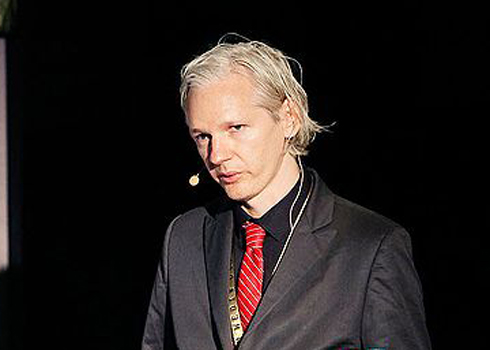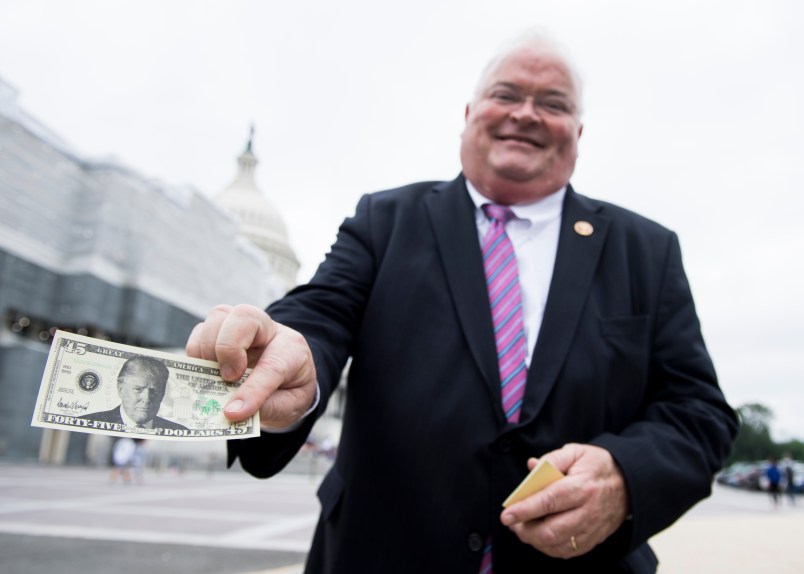John Cook | Gawker
Wikileaks founder Julian Assange’s reputation as a fighter for transparency and destroyer of secrets ought to be thoroughly demolished by today’s spectacle of the New York Times literally forcing him to give up the Guantanamo Bay files he’d been hoarding for months.
Assange has been sitting on the 700-plus Gitmo detainee files since at least May of last year, when accused Wikileaker Bradley Manning confessed in a chat session to passing them to Wikileaks along with a plethora of classified military reports and diplomatic cables. They were the final sizable arrow in Assange’s anti-government quiver, and for months we’ve been waiting, and waiting, and waiting for their inevitable release. But Assange kept holding back.
They were published last night, at long last, only because the New York Times finagled its own copy–presumably from Wikileaks defector Daniel Domscheit-Berg–and shared it with NPR and the Guardian. Wikileaks, which had been working with the Washington Post and other papers on the Gitmo papers but was still keeping the information embargoed, scrambled to get its own version up.
If a newspaper had scored a trove of Gitmo papers and kept them secret for a year, the delay would cause a minor scandal–as the New York Times‘ decision to hold its blockbuster illegal surveillance story did. The fact that Wikileaks represents itself not as a newspaper but as a force for transparency and an anti-secrecy organization makes it all the more galling that Assange had to be prodded by the hidebound Times–which had no incentive to dawdle–into actually, you know, revealing his secrets.
And those secrets remain largely unrevealed! Wikileaks’ own headline–“The Guantanamo Files: 779 classified prisoner dossiers revealed from the world’s most notorious prison”–is a lie. âWikileaks has only teased 80 of the files it claims to have, promising that the rest “will be released daily over the coming month.” It made a similar promise with the 250,000 classified diplomatic cables that it never actually released–so far, 7,579, or 3% of the total, have been released. The rest remain, for all intents and purposes, classified. When it comes to the Gitmo files and the cables, Assange is an agent of secrecy, not its enemy.
Why the strip-tease act? Assange has claimed in the past that simply dumping secret data on the web is a strategy for making sure that newspapers ignore it, and that in order to honor his sources’ desires for maximum impact, he needs to work with “news partners” and drag things out a bit. He’s also cited “harm-minimization”–the need to review each document to make sure informants and such aren’t named before publication. But if his sources’ wishes are to be honored–and to be clear, Manning has for the past year been essentially Assange’s only source–then Assange had better speed things up. In chats with hacker Adrian Lamo before he was arrested, Manning made clear that he took the risk of leaking his mother lode to Assange because he wanted it all–not just 3%–made public: “Hillary Clinton and several thousand diplomats around the world are going to have a heart attack when they wake up one morning and find an entire repository of classified foreign policy is available, in searchable format, to the public…. [It will be] worldwide anarchy in CSV format…. Beautiful, and horrifying.”
If Assange were acting in Manning’s interest, he would have gone for “worldwide anarchy” and thrown everything up as soon as he could. But he took another tack, one that involved partnering with high-profile news outlets, releasing Manning’s data in dribs and drabs while continuously hinting at the next blockbuster disclosure, and becoming a global celebrity in the process. While Manning sits in a prison cell.
More recently, Assange has come to view the unpublished bits of Manning’s cache as, literally, insurance. That’s what he called the 1.4 gigabyte encrypted file he posted to Wikileaks last year, just a month before allegations of rape surfaced against him in Sweden. The clear implication was that if anything happens to him–like, say, extradition to Sweden to face the aforementioned charges–a password would be distributed and the file made public. With each new disclosure, that insurance file affords him less and less leverage, which explains his reluctance to follow Manning’s wishes and actually disclose information.
And with the Gitmo files–assuming he actually carries through on his promise to release the remaining ones–Assange has essentially blown his wad. The only outstanding bits he has from Manning are videotape of a 2009 airstrike in Granai, Afghanistan by U.S. gunships that killed roughly 100 civilians and 15,000 “war logs” from Afghanistan that he held back from release last year for further redaction. In his chats with Lamo, Manning described the Afghanistan video as “not nearly as damning” as the other video he sent to Wikileaks, footage of two Reuters journalists being killed by U.S. helicopters in Baghdad. And it’s unclear what the remaining war logs contain, but any news in them has almost certainly been reported by the New York Times and the Guardian, which also had access to the full unredacted cache. Aside from those Manning leftovers, Assange is also said to have the hard-drive of a Bank of America executive from 2006, but the data on it is “not self-explanatory and…he personally was unable to make much sense of it,” according to Reuters.
In other words, the Gitmo files could be Assange’s last hurrah. Wikileaks’ encrypted submission has been broken for more than a year now, which means no new juicy tidbits have been coming in. And without the threat of more earth-shattering disclosures down the road, will anyone really care whether Assange is extradited to Sweden, or gets convicted of rape, or goes to jail? Not really. Which is why he’s publishing the Gitmo files under duress.
[Photo of Assange, top, via AP. Photo of Domscheit-Berg and Assange, bottom, via Getty Images]
The original version of the story appears here: http://gawker.com/5795398/why-julian-assange-cant-let-go-of-his-secrets
Gawker dishes the nation’s most current and cutting gossip across media, entertainment, technology, and business. Founded in 2002 and namechecked frequently in mainstream publications, the site is essential reading for those who want big media hypocrisy debunked and faux-sincerity exposed, all with a healthy dose of snark.










